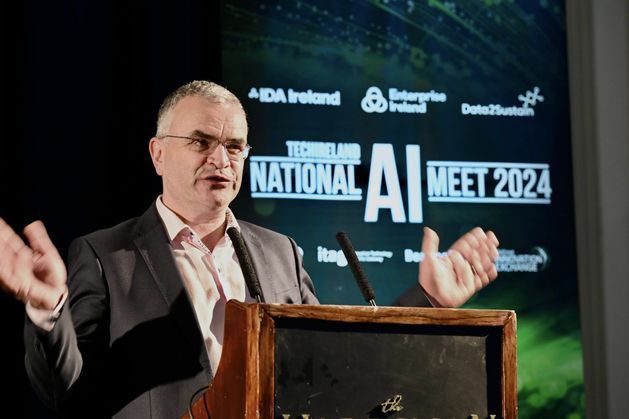The country needs an “order of magnitude” of extra power generation to meet the requirements of AI developments, TechIreland’s National AI Meet event in Galway was told
To avoid decline, Ireland needs to invest heavily in renewable energy generation, said Barry Downes, managing director of Sure Valley Ventures.
“As we go through orders of magnitude of increases in data centres and computing power, we need orders of magnitude in increasing our power generation,” Mr Downes told TechIreland’s National AI Meet 2024 in Galway.
“This will become a very significant macro issue. We already see in Ireland challenges in terms of commissioning and launching new data centres.”
Eirgrid estimates that Ireland needs around 350 projects, at an investment cost of €3bn, by 2030 for an adequate power grid.
A report from the Sustainable Energy Authority of Ireland (SEAI) this week showed that total demand for electricity last year grew by 4.4pc, or 1.3 terawatts (TW), but 80pc of that increase, or 1.1TW, was from data centre growth.
Data centres accounted for 20pc of all electricity use in the State, the report said.
Mr Downes said that there is now a “huge” opportunity for Ireland in generating renewable power, in wind, offshore and solar.
“We will need to get to grips with as a country. Do we want to play a key role in the rollout of computing power? If we do, then we’re going to need to generate more. We’re going to have to do true renewables.”
A recent report by Ernst & Young claimed that Ireland is the fifth most attractive country in the world to invest in for renewable energy projects.
The conference, part-sponsored by the IDA and Enterprise Ireland, also heard addresses on Ireland’s AI strategy from the head of the country’s AI Advisory Council, Dr Patricia Scanlon, and Dara Colleary, Minister of State at the Department of Enterprise.
Dr Scanlon said that despite the hype cycle, AI was “here to stay” and compared it to the advent of the internet and mobile phones.
Minister Dara Colleary said that the government wants 75pc of Irish companies to be using AI by 2030, adding that Ireland was ahead of the EU average on AI adoption, by some metrics.
“Half of the funding we have allocated to date in our disruptive technologies innovation fund, which is worth about €500 million, has gone to projects that have an AI element to them,” he said.
“The seventh call is now open on a rolling basis and the current deadline for that is April 2025.”
He called on startups to apply for the funding, particularly those with “ideas and collaborative technologies”.
Mr Downes said that his venture capital investment firm was “looking for software companies that are building upon these foundational technologies to solve real problems in real enterprises”.
A number of local Irish companies and multinationals, including OpenAI, Google, Microsoft, Amazon and Boston Scientific, gave examples of how to use AI in practice.
OpenAI’s head of solution architecture, Colin Jarvis, told the Irish Independent that a number of European tourism agencies would soon visit Dublin to study how the city has developed a generative AI tourism service for visitors ot the capital.
There was also a cautionary note struck by TechIreland director and veteran investor Brian Caulfield.
“AI is not as new as we think, it’s not as clever as we think, and it’s not as dangerous as some may think,” he said.
“We’re still a long way from artificial general intelligence. We have a fantastic set of tools for various applications, recognisers, generators and large language models. But these are really statistical models and we’re a long way from being able to connect those components with anything that you could really call reasoning.
“I’m not saying that there are not dangers of AI that don’t need to be thought through or managed carefully. We’ve all seen very real harms that can come from the proliferation of convincing generative AI fakes, the dangers of hallucination bias encoded in training data sets, perpetuating inequality and so on.”
“Looking at AI broadly, I think that we’re probably just past the peak of inflated expectations and heading down towards the trough of disillusionment. But I also want to remind you of [Roy] Amara’s law, which states that we overestimate the impact of technology in the short term, and underestimate the effect in the long run.”

